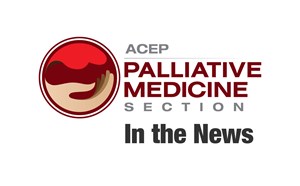
ED Case Corner
The newsletter editors are pleased to introduce this new addition to the palliative section newsletter. We will use actual cases to highlight how palliative care made a difference for an emergency department patient. Contributions welcome! (500 words or less).
Make ACP as Familiar as ABC
Our skill in caring for the most critically ill patients, 24-7-365, defines us as Emergency Physicians (EP’s). The "standard" A-B-C algorithm, typically ingrained in us on day one of internship, springs to mind when the 96 year old female arrives in severe respiratory distress. But in this case, and many like her, it also becomes immediately clear that she is cachectic, bed bound, non-verbal with advanced dementia. In short, she has a terminal disease and is near death. For her, the burdens of critical care can be considered harmful, especially if they are not congruent with her goals and values. It’s time for a new standard.
A simple modification to the A-B-C algorithm would be to remember that 'A' is not just for airway, but is also for Advance Care Plan, stated by Dr. Tammie Quest, EP and President Elect of the American Academy of Hospice and Palliative Medicine. If the patient is not decisional and the EP cannot leave the bedside, support staff can check records or contact the patient's decision-maker while the patient is temporized with bipap, nebulizer treatments, suctioning, and the like.
In this case, the patient’s son arrives with her POLST, stating that she is DNR and wishes to have comfort measures only. All efforts should now be focused on aggressive symptom management. This often requires 1 to 1 nursing, multiple doses of morphine, 0.5 - 2 mg per dose IV push, titrated for comfort / dyspnea, benzodiapines for distress, glycopyrolate or atropine for secretions. Monitors should be off, and family should be supported at the bedside by ED staff, social work, chaplaincy, and / or the palliative care team, as needed or available, while allowing for natural death.
Death is difficult, period. But our core mission, providing the highest quality care of the critically ill, includes dying patients, and requires making ACP as familiar as A,B,C. This can lead to peaceful dignified deaths for appropriate patients, support for their families, and a feeling of satisfaction for us at the end of the day.


